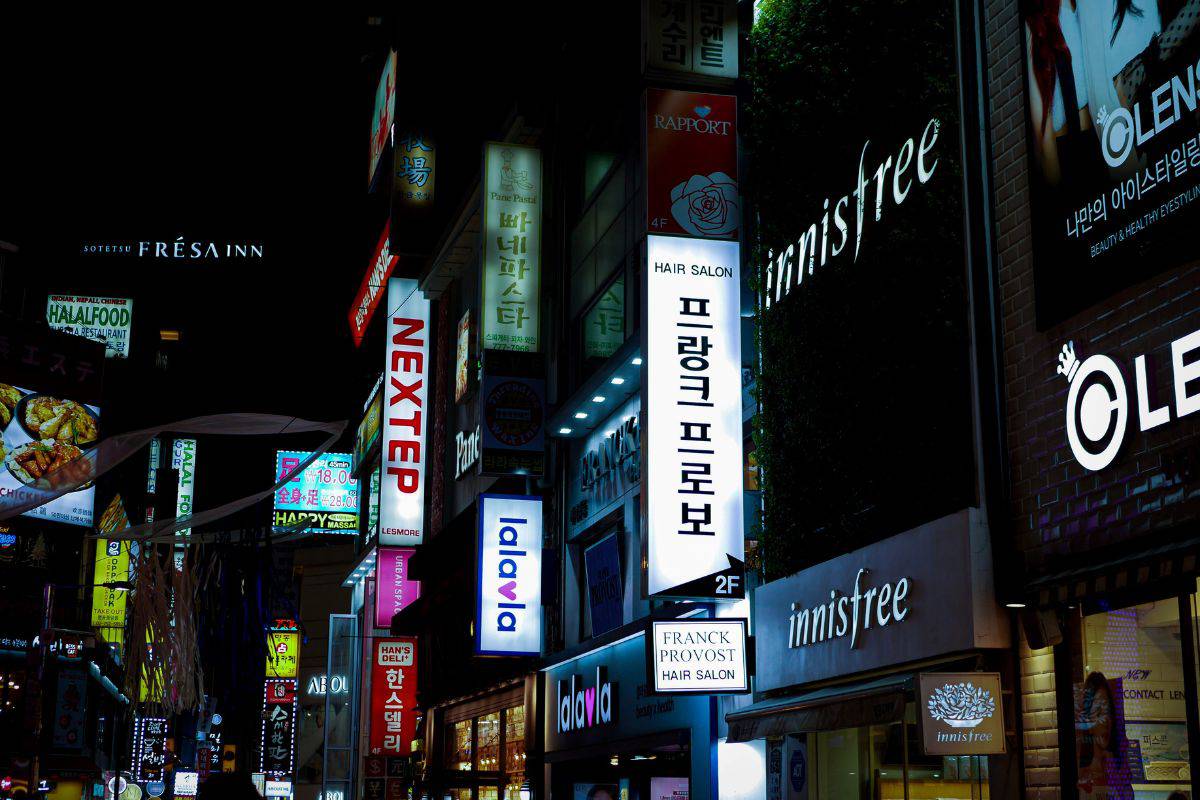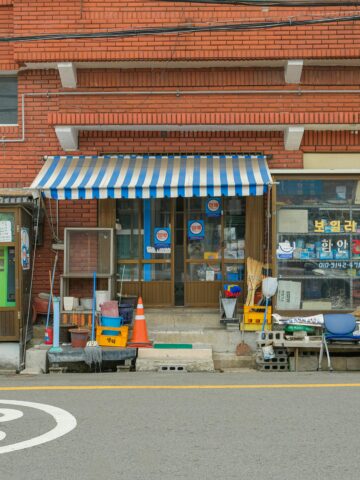Searching for apartments in Korea can be challenging for new expats, especially those who need help figuring out where to start. It’s important to note that you may need to engage in house-hunting quite often considering that most Korean housing contracts are only 6 months to a year.
But don’t worry— the process is easy, and many agents in Korea are willing to be your guide. If you don’t know where to go, seek out an English-speaking real estate agent or jung-gaein (중개인), and they will take care of the rest.
Before agreeing to a gye-yag-seo (계약서) or housing contract, you should know the lease terms, the property's condition, and most importantly, your budget. Additionally, one unique consideration about Korea is the need for a hefty security deposit, known as key money or jeonse (전세).
Key money in Seoul is generally between 4 - 7 million won (or even as much as 10 million won) and will be returned at the end of your rental term. Additionally, consider the kind of housing that best fits your lifestyle and preferences, determine whether you can handle roommates, and figure out if the nature of your work involves specific requirements for your room (such as an extra quiet space).

Jump to:
🤔 What It’s Like Finding Housing in Korea
Many expats need to actively find housing in Korea each year, and while you can find real estate offices or budongsan (부동산) on every street, not all of them accommodate foreigners. For example, during my first month in Korea, my area had numerous budongsan, but none of the agents spoke English.
Fortunately, an expat friend referred me to someone she knew. But when I examined the receipt, I was surprised to discover that they had charged me for “translation services.” Although this wasn’t a big issue for me (as I understand that English is a specialized skill in Korea), I was later informed that most other agents provide this service for free, and I could’ve obtained a better deal elsewhere.
Therefore, if you find a truly exceptional budongsan, stick with them and recommend them to your friends. I eventually discovered the joy of using Seoul housing apps like Ziptoss and Zigbang. What I love about these apps is that they connect you directly to the real estate agents who handle the rooms you’re interested in. It’s not entirely user-friendly, as it took me a while to figure it out and understand.
However, once you get the hang of it, you can see which rooms fit your budget, the benefits you get for staying in the room, and how much you’ll pay monthly for electricity, gas, water, and maintenance.
The only downside is that you need to allot a day for in-person inspections because some rooms don't look like the ones shown in pictures, and some of the choices you have are either for those who wish to sign a contract for 2 years or more or are only for Koreans (try not to take it personally).

Other expats also believe bringing a Korean friend could help reduce the monthly rent, though that hasn’t been my personal experience. So if you have a friend who can join you in your house-hunting and contract signing, make sure they’re good at bargaining and you may secure yourself a good deal.
If you don’t have a friend with you while you’re with your real estate agent, always keep this in mind: don’t say yes to the first room! You can always come back. Also, look out for special deals, as some rooms offer all-inclusive packages.
This means you can enjoy unlimited water, electricity, gas, and internet for the same fixed monthly fee. Furthermore, you won’t have to handle the bills yourself because your landlord will take care of them for you, which is only a small hassle once you’re used to it, but can be frustrating to handle when you’re still learning Korean. It’s important that you always ask about any inclusions before signing a contract.
Areas 5-10 minutes away from public transport have ridiculously high prices, and landlords usually offer small and cramped rooms in those areas. If you frequently leave the house and only need a living space, this option might work for you. But here’s a pro tip: better deals are available at a cheaper price if you don’t mind living a bit farther from the station.
Make sure you know the location of your local community center or juminsenteo “주민센터.” You can find this information by searching “community center” or “주민센터'' in Kakao Maps. The first result will be the one closest to your immediate area.
After visiting the budongsan, you must register your new home at the community center within 15 days. Present your ARC (Alien Registration Card), your new address, and the housing documents you and your landlord signed. This process is quick and straightforward, and most community centers have personnel who can speak English.

⏲️ Timeframe for Apartment Hunting in Seoul
The best time to go apartment hunting is 2-3 weeks before your move-in date, because most housing sites and Facebook groups advertise rooms for immediate occupancy. Back when I first moved to Korea, I tried to secure a house a month in advance but encountered many rejections from real estate agents.
If you visit their office months before your move-in date, they will likely promote low-quality rooms or, even worse, underground housing and dorms or gosiwons (고시원), which are windowless officetels.
Don’t worry if you are nearing the deadline of securing housing (as expats need to present a copy of their rental contract to the Immigration Office to update their ARC), as it’s not overly challenging to find a room as long as you patiently inspect the ones shown to you by the real estate agent. There’s enough turnover in the housing market in each city that there’s always inventory available.
Those who aren’t too picky about their living space can find a decent room after a day of house-hunting. Korean real estate agents are very straightforward in their approach— they’ll simply ask for your budget and requirements, and they’ll do the rest.
Once you provide them with the necessary information, they’ll give you a list of potential places to live and even accompany you to the houses you’re interested in. The best part about working with an agent is that they’ll handle the paperwork for you, but you’ll need to personally take the documents to the community center.

Having specific requirements for a room isn't a problem, as Seoul offers endless options in this regard. However, if you are very particular about the location, be prepared for a potentially lengthy search— especially if your monthly rent budget is limited to ₩350,000 ($260) or less.
Those who can afford more have a higher chance of securing a favorable deal, such as a slightly larger space or better amenities.
Given that most people prefer living near Line 2, which is the fastest line connecting to other lines, I'd advise you estimate a monthly rent of at least ₩450,000-₩600,000 ($330-$ 440) for the Seoul area, along with a security deposit of 4 to 7 million KRW ($2,980-$5,200).
Expats may also prefer living in culturally friendly communities such as Gangnam, Itaewon, Hannam-dong, Yeonnam-dong, or Seongsu-dong. However, these places are expensive due to their proximity to business and commercial districts.
If you want to experience the vibe of these areas but are on a tight budget, there are alternative locations you can check out. I recommend searching for homes in districts like Dongdaemun (동대문), Nowon (노원), and Seoul National University Venture Town (서울대벤처타운).

✍️ Tips for Finding Accommodation in Seoul
When searching for a good place to live in Seoul, there are a few things to remember to make the process as easy and stress-free as possible. Here are some tips that can help you find the perfect housing in this bustling city:
1. Consider other neighborhoods.
Consider exploring neighborhoods in Seoul beyond the popular areas. Seoul is a large and diverse city, with each neighborhood offering a unique vibe that can align well with your needs.
For example, if you are an artsy introvert with a creative thirst, you might prefer being near Daehakro, Mullae, or Hapjeong. If shopping and access to cultural experiences are your priorities, settling in Dongdaemun, Insadong, and Myeongdong would be ideal.
2. Hire a reputable real estate agent.
While every neighborhood has plenty of real estate offices, it's advisable to rely on the ones recommended by your friends. This approach saves you time and effort since you already know the unexpected costs, are familiar with the process, and have the assurance of effective communication through their recommended agent.
Moreover, if your friends have had a positive experience, it's highly probable that you will too!

3. Do not go for gosiwons and underground units unless absolutely necessary.
While it's true that these rooms are very cheap and can save you a lot of money, living in them can be highly uncomfortable due to the lack of amenities and potential safety hazards.
Gosiwons, in particular, may offer a certain level of privacy but often lack sufficient safety measures. Basement units, for instance, rarely have proper emergency exits, posing a significant risk— especially in flood-prone areas (as exemplified by the recent Gangnam flood disaster). It’s advisable to consider these places only if you have no alternative options available.
4. Check the lease terms carefully.
Even if your real estate agent is from a reputable company, it's essential to carefully read the lease terms yourself before signing. Remember to be vigilant for any hidden fees or restrictions that could impact your living situation.
5. Be prepared to pay a deposit.
In Korea, a substantial upfront payment known as “key money” or jeonse (전세) is customary when renting an apartment. This can represent a significant expense, so it’s important to be prepared and set a budget for it.
As a general guideline, you must allocate at least 3 million KRW to secure decent accommodation. However, some agreements can be cheaper depending on the neighborhood’s value, proximity to public transportation, and the landlord’s terms.

6. Be familiar with Korean housing laws.
Reading about Korean housing laws is great as it can help you avoid legal issues and the risk of deportation. Additionally, educating yourself about your neighborhood’s trash disposal regulations can help you assist your landlord with proper waste management.
7. Network with other expats.
If possible, avoid staying in one place for too long. Explore different neighborhoods and interact with other expats. By doing so, you’ll have the opportunity to discover exciting places to live, make friends from various parts of the world, and engage in new experiences while in Seoul.
Who knows, networking with other expats may even open doors to better opportunities, such as work, if you decide to extend your stay in Seoul.
8. Learn words related to housing in Korea.
The words below will prove incredibly useful when browsing housing apps or interacting with a real estate agent or “jung-gaein” (중개인). A building is referred to as “geonmul” (건물), while rooms are called “bang” (방).
Apartment buildings are commonly known as “apa-teu” ( 아파트), and the rooms within them are called one-rooms or “wonlum” (원룸). One-rooms typically range from 16.5m² to 33m² in size and often come furnished with major home appliances.
In my small town in Gangwon Province, my one room (a studio apartment, really) was 24m², or about 260ft². This information is normally included in the listing when using housing apps like Zigbang and Dabang. Please note that housing apps typically present the security deposit or bojeung-geum (보증금), followed by the monthly rent or wol-se (월세).
For example, if you come across a listing like 월세100/35, it means you’ll need to pay a security deposit of 1 million KRW and a monthly rent of 350,000 KRW. Additionally, you should take into account the maintenance fee or gwanlibi (관리비), which is listed separately and paid monthly.

👍 Best Websites for Finding Apartments in Korea
Please be aware that even if you use websites to search for apartments in Korea, you’ll still be redirected to the real estate offices of the ones handling the room you’re interested in.
1. Zigbang
Zigbang is the largest housing website in Korea, and locals and foreigners widely use it to connect with real estate agents and find vacant homes. Many expats find it the easiest way to search for housing due to its user-friendly interface.
However, some familiarity with the Korean alphabet or Hangul is necessary when navigating the search engine (or you can use Papago to translate locations into Korean). In addition to helpful pictures that provide insights into the room’s appearance and inclusions, the map view also offers an estimate of the distance to the nearest station, school, or workplace.
However, it's important to note that some listings may have misleading information or differ significantly from the pictures they present during visits. In such cases, you can report these posts to protect fellow expats from potential scams.
- Pros: User-friendly interface, map view
- Cons: Some listings may have misleading information, familiarity with Hangul
2. Dabang
Dabang is a popular housing website among locals when searching for apartments in Seoul. However, this website is rarely used by expats because it requires some proficiency in Korean when navigating its interface.
Like Zigbang, you can use the search engine to input your desired location, providing a comprehensive list of available apartments for rent. You can also adjust the monthly rent range to match your budget. Once you find a suitable option, the website lets you contact the real estate agent responsible for the listing.
Many people consider Dabang to be more accurate than Zigbang, although there have been cases where agents leave rented listings on the site to attract potential customers.
- Pros: Includes monthly range view
- Cons: Requires Korean proficiency

3. Booking.com
Booking isn't limited to hotels and guesthouses. Because of its foreigner-friendly interface, you can also use the website to find a home in Seoul, even for longer-term rentals (6 months or more). Despite this, it's worth noting that Booking isn't the primary platform that real estate agents use to promote their listings, so the housing options available are limited.
- Pros: Foreign-friendly interface
- Cons: Not the primary platform used by real estate agents
4. Rentberry
Rentberry is another user-friendly website that allows you to find apartments in South Korea, functioning similarly to Booking.com. You can use the filters to specify your preferences, such as the type of bedroom you want, the desired number of bathrooms, and whether pets are allowed. Unfortunately, just like Booking, available choices on this platform are limited.
- Pros: Functions similarly to Booking.com, includes filters
- Cons: Limited choices
5. Craigslist
Believe it or not, you can actively search for a home using Craigslist. Individuals who post listings on this platform also include pictures and direct descriptions that offer all the necessary information to secure the apartment.
Craigslist is regularly updated to ensure that the listings provided are recent. However, you should note that you can't specify the location, and there’s no map view available to estimate the room's proximity to your workplace, school, and station.
Additionally, most listings on Craigslist are not from real estate agents, which may result in potential issues with contracts and documentation.
- Pros: Includes direct descriptions and other necessary information
- Cons: No map view and specific locations included

6. Naver Real Estate
If you’re specifically searching for apartments, consider using Naver Real Estate, because it predominantly features listings for apartment complexes (the overwhelming majority of options in Seoul, regardless).
One drawback of this site is the lack of comprehensive information about the rooms within the apartment, particularly regarding the available room types. Plus, the location verification feature on Naver Real Estate is often unreliable. In this case, it's better to use Zigbang and Dabang, as they offer more reliable choices.
- Pros: Features listings for apartment complexes
- Cons: Lacks comprehensive information
7. Facebook Groups
You don’t have to rely solely on apps to find good housing in Korea. Some groups, such as Rent Apartment in Seoul and Apartments/Housing for International Students in Korea, regularly update information about budget-friendly housing in Seoul. You can also make posts seeking help or advice before making your final decision.
- Pros: Updated information about budget-friendly housing, make posts seeking help or advice
- Cons: No map view
8. Ziptoss
If you truly need assistance, Ziptoss connects you with English-speaking real estate agents who can guide you through the entire housing process, from selecting a house to signing a contract.
They also offer solutions to connect you with furniture rental services if you prefer to avoid buying your own furniture but still want items that can enhance your stay in Korea. Additionally, if you need help selling your belongings because you no longer need them, you can contact Ziptoss agents to help you.
- Pros: Connects you to English-speaking agents and furniture rental services
- Cons: Some listings may have misleading information





Comments
No Comments